By Gary Symons
TLL Editor in Chief
Image credit: Photo of the Kraft Heinz global headquarters, courtesy of The Kraft Heinz Co.
Earthshaking news in the food and beverage sector as Kraft Heinz, one of the world’s largest food brands, announced it is splitting the company into two separate entities.
The Kraft Heinz Co. says its board of directors has unanimously approved a plan to separate the food giant into two independent, publicly traded companies, in what it called a move to sharpen focus and boost long-term shareholder value.
The Chicago- and Pittsburgh-based company said the tax-free spin-off will create “Global Taste Elevation Co.” and “North American Grocery Co.,” each with distinct strategic priorities and brand portfolios. The separation is expected to close in the second half of 2026, pending regulatory and board approvals.
Global Taste Elevation Co. will focus on international growth, with a portfolio that includes Heinz, Philadelphia and Kraft Mac & Cheese. The business generated about $15.4 billion in net sales in 2024 and $4 billion in adjusted EBITDA, according to the company.
Roughly three-quarters of its sales come from sauces, spreads and seasonings, while 20 percent are tied to emerging markets and 20 percent to the away-from-home sector.

North American Grocery Co. will center on staples in the U.S. and Canada, anchored by Oscar Mayer, Kraft Singles and Lunchables. Led by Kraft Heinz CEO Carlos Abrams-Rivera, the unit posted $10.4 billion in 2024 sales and $2.3 billion in adjusted EBITDA. About 75 percent of its revenue comes from brands that rank first or second in their categories.
“Kraft Heinz’s brands are iconic and beloved, but the complexity of our current structure makes it challenging to allocate capital effectively, prioritize initiatives and drive scale in our most promising areas,” said Miguel Patricio, executive chair of the Kraft Heinz board. “By separating into two companies, we can allocate the right level of attention and resources to unlock the potential of each brand to drive better performance and the creation of long-term shareholder value.”
Abrams-Rivera, who will lead North American Grocery Co., said the separation will allow both businesses to accelerate their strategies.
“This move will unleash the power of our brands and unlock the potential of our business,” he said. “This next step in our transformation is only possible because of the commitment of our 36,000 talented employees who deliver quality and value for consumers every day.”
Jack Pope, lead director of the board, said the decision followed a comprehensive strategic review. “We strongly believe that increased focus will translate into better performance and value creation for shareholders,” he said.
Patricio, who served as Kraft Heinz CEO from 2019 to 2023, will remain executive chair and work closely with Abrams-Rivera during the transition. The company has hired a global executive search firm to identify a CEO for Global Taste Elevation Co. Kraft Heinz said it does not plan to move its headquarters.
The company expects up to $300 million in dis-synergies from the split but said it sees opportunities to offset a substantial portion of that figure. Both businesses are expected to maintain investment-grade credit ratings and sustain Kraft Heinz’s current dividend level.
The board has also formed a separation committee, led by vice chair John Cahill, to oversee the process. Cahill, a former Kraft Foods CEO, will guide execution of the separation alongside management.
The strategy reverses the merger of Kraft and Heinz, which began in 2013 when the billionaire investor Warren Buffett teamed up with Brazilian investment firm 3G Capital to buy the H.J. Heinz Co. At the time, the $23 billion deal was the most expensive ever in the food industry. Buffett later said he may have paid too much for the brand.
3G was also behind the formation of Restaurant Brands International — a merger of Burger King, Tim Hortons and Popeyes — and Anheuser-Busch InBev. 3G is a said to be a cautious investor known for strict cost controls and ‘zero-based budgeting’, which requires all expenses to be justified each quarter.
The original deal was intended to help Heinz, which was founded in 1869 in Pittsburgh, expand sales of its condiments and sauces on grocery store shelves.
At the same time Kraft, based in Chicago, was looking for a partner after a 2011 split from its snack division, which became Mondelez International. Buffett and 3G were agreeable to a merger, and the consolidation of Kraft and Heinz happened in 2015, creating the fifth largest food and beverage company in the world, with annual revenues of $28 billion.
However, analysts say the company still struggled to grow revenue, and according to the board, a more flexible arrangement is needed to allow for greater innovation and strategic manoeuvering in the face of major changes in food and beverage trends toward healthier, but still convenient, choices.
The merger will mean big changes in the Food and Beverage Licensing sector, particularly in North America, where Kraft Heinz has been a dominant force over the past decade. With the help of top licensing agency Brand Central, Kraft Heinz has become a licensing juggernaut, involved in hundreds of licensing deals both in food and beverage products, but also in partnerships that extend the brand into non-food-related categories.
